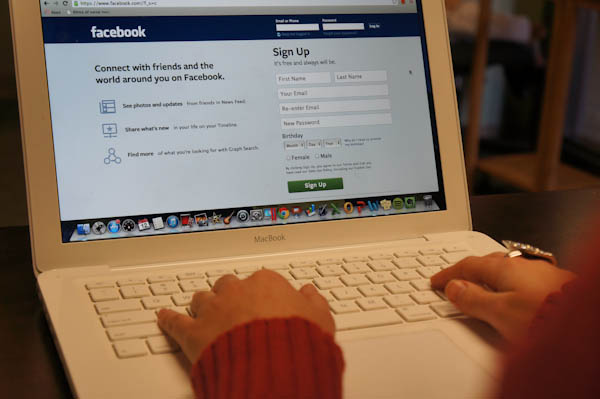Photo by: Henoc Kivuye
Mark Zuckerberg created Facebook on Feb. 4, 2004; 10 years later his idea has become one of the fastest growing social media sites, with over a billion active users worldwide.
“Anything that keeps you connected with the world is good,” senior Eshara Griffin said. “Facebook keeps me connected with friends all over the world, because when your phone goes off you feel like as long as you have Facebook you are still connected with people and what’s going on in life.”
Despite the many obstacles that have riddled Facebook’s journey, it has strived to connect the world, according to an article by the Associated Press, “Facebook Celebrates 10 Years of Friend Requests.”
“Facebook has had plenty of stumbles along the way, from privacy concerns to user protests when Facebook introduced new features, not to mention a rocky public stock debut in 2012,” the Associated Press said. “Even its origin was the subject of a lawsuit and a Hollywood movie.”
Facebook has goals of reaching new users. They plan to reach new users through fast-paced, expansive global growth.
“As Facebook enters its second decade, the company faces a new set of challenges in reaching the next billion users, the billion after that, and the one after that, including the majority of the world without Internet access,” the Associated Press said.
Griffin does not express the same optimistic feelings for Facebook.
“I think Facebook is going to face the same death as Myspace, which was the biggest thing back then,” Griffin said. “It will be huge for a while and suddenly something else will come in place of Facebook.”
Junior Kristina Car expressed doubt that Facebook would last the next 10 years.
“Although Facebook just celebrated its 10th anniversary, I don’t think it will last another 10 years,” Carr said. “I think someone will invent something else. You already have Twitter and Instagram. I know some of my friends, they no longer use Facebook because they like Twitter better. A lot of people have switched over to other social media platforms because it fits more of what they are into.”
Users have to be 13 or older to have a Facebook account, but according to sophomore Brentley Williams, the age restriction is not enough to keep underage children from creating accounts.
“I don’t like the fact that younger people are constantly on Facebook,” Williams said. “They should be in school studying. They have no reason to have Facebook accounts. They just need to get their lives in order. If they are religious they need to go to church. They need to hang out with friends.”
Privacy issues have plagued Facebook since the beginning. Carr said younger users are more likely to post information violating their privacy.
“One thing that concerns me about Facebook is the lack of privacy for the younger generation,” Carr said. “The younger generation is posting pictures where other people can see where they live, where they go to school. I feel like a lot of the younger generation might not be aware of that and what precautions to take to prevent some creeper from seeing where they live.”
Williams thinks Facebook should increase the age restriction from 13 to 16 years old.
According to some students, one of the issues that Facebook should resolve is the constant change it makes on users’ accounts without their permission or knowledge.
“A lot of people get upset about all the changes they make because they like it just the way it was,” Carr said. “Sometimes they will move your homepage from the right side to the left side and it gets confusing because you don’t know where things are. Sometimes you just need to leave things the way they are.”
When changes constantly occur with Facebook’s accounts, according to Griffin, users often feel confused.
“It is my own Facebook and I should not be lost,” Griffin said. “It is like I am coming back to my own house and finding that everything has been rearranged in my house and I don’t know where anything is. It is uncomfortable.”
Though Zuckerberg himself seems intent on adapting Facebook to keep it alive, Griffin has one piece of advice.
“He should ask us before he makes changes on our accounts,” Griffin said. “He should give out surveys to see how people feel about the changes before he makes them. Not everybody likes change.”












Be First to Comment